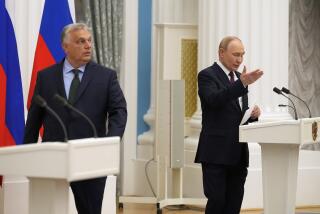Yugoslav’s Visit to Russia Upsets U.N. Tribunal
MOSCOW — Among the dignitaries who stood watching Russia’s Victory Day parade last week was a wanted man: a top Yugoslav official indicted on war crimes charges, Defense Minister Dragoljub Ojdanic.
Though Russia is obliged to arrest those indicted for war crimes, Ojdanic visited Moscow from May 7-12, attended the parade, met with acting Defense Minister Igor D. Sergeyev and other Russian military officials, and flew out without anyone laying a finger on him.
His visit was not announced beforehand, and only after his departure were details leaked by military sources to Russian news agencies, which reported the trip without mentioning the charges against Ojdanic.
Yugoslav President Slobodan Milosevic and four other Yugoslav officials, including Ojdanic, were indicted last May on charges of masterminding the mass killings and deportations of ethnic Albanians last year in the separatist province of Kosovo. It was the first time that a head of state had been indicted on war crimes charges, and Milosevic has been shunned by most countries since.
On Monday, news of Ojdanic’s visit proved dismaying to officials at the International Criminal Tribunal for the Former Yugoslavia in The Hague.
“This is spilt milk. To us, this represents a lost opportunity,” said Paul Risley, spokesman for the prosecutor’s office at the tribunal. “It truly is unexpected and rather alarming. Russia runs the risk of being seen as a nation that does not cooperate with the tribunal and of being considered as being in noncompliance.”
Risley said the tribunal will write to Russia seeking an explanation for Ojdanic’s visit.
The trip underscored the lingering bitterness, particularly within the Russian military, about the NATO bombing of Yugoslavia last year, and it suggested defiance within Russian officialdom of the tribunal’s pursuit of war crimes suspects.
The visit also raised concerns about whether Russia will turn its back on Western standards with regard to such issues as war crimes and human rights under newly inaugurated President Vladimir V. Putin.
However, it remained unclear Monday whether the Kremlin had approved the visit. A duty officer at the presidential press office said Monday evening that the press service had no information on the matter.
A Defense Ministry spokesman said the ministry was not aware that Ojdanic had been indicted.
“We at the Defense Ministry have no information whatsoever about him allegedly being listed as a war criminal anywhere,” said the spokesman, who identified himself only as Vladimir Nikolayevich, declining to give his surname.
A Foreign Ministry spokesman, Anatoly K. Kobzev, said the ministry had no information about the trip.
Russia’s obligation to arrest those indicted on war crimes charges comes as a consequence of its membership in the United Nations. It has a permanent seat on the U.N. Security Council, which created the International Criminal Tribunal for the Former Yugoslavia in 1993.
Ojdanic’s visit to Moscow began on the day of Putin’s inauguration and continued amid the wave of spirited flag-waving occasioned May 9 by Victory Day--the holiday marking the defeat of the Nazis in World War II--which is sometimes portrayed here as a victory of the Slavic peoples.
Russia’s sense of fraternal Slavic solidarity with Yugoslavia was one reason for its deep anger over the North Atlantic Treaty Organization’s 78-day air campaign last spring, which led to the most serious rift between Russia and the U.S. since the end of the Cold War.
Military analyst Pavel Felgenhauer of the Sevodnya newspaper said it seemed clear to him that Russia planned to simply ignore the tribunal’s war crimes indictment list.
“The Russian Defense Ministry, which is known quite well for its pro-Yugoslav position, invited Ojdanic and demonstrated once again that this list doesn’t mean much in Russia,” he said.
The Ojdanic visit fit a pattern of Russian contact with Yugoslavia. The Yugoslav foreign minister, Zivadin Jovanovic, began a two-day official visit to Moscow on Monday. He was scheduled to meet with acting Russian Foreign Minister Igor S. Ivanov today.
During a 2 1/2-day fact-finding mission to Kosovo last month by a nine-member Security Council delegation, the Russian and Chinese envoys met Milosevic at the outset--leading to bitter complaints from some other delegates.
Risley, the spokesman for the Hague tribunal’s prosecutor, said a letter to Russia concerning Ojdanic’s visit is likely to come from the tribunal president, Claude Jorda.
He said Russia’s failure to arrest Ojdanic created “a unique situation.” In the past, Russia has cooperated well with the tribunal, he said.
“We’re alarmed by these reports. It would be apparent that they [Russian officials] recognized who this individual was and failed to arrest him as they are obliged to do as members of the U.N.
“This is an individual who, as a colonel general in the Yugoslav national army, commanded the army and police units who engaged in a campaign of terror in Kosovo from January through May last year,” he said.
Ojdanic was chief of staff of the army at the time of the reported offenses.
Milosevic appointed Ojdanic defense minister Feb. 15 as a replacement for Pavle Bulatovic, who was assassinated earlier that month.
More to Read
Sign up for Essential California
The most important California stories and recommendations in your inbox every morning.
You may occasionally receive promotional content from the Los Angeles Times.










